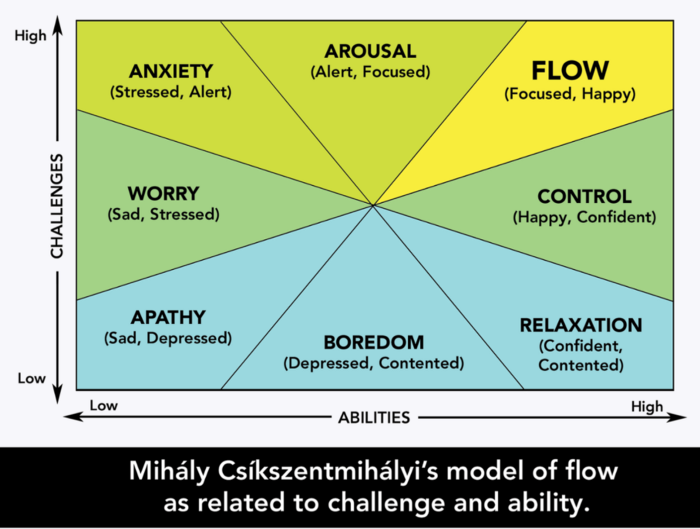The Beauty of Flow State
A lesson learned decades ago continues to prove out

In flow state, you feel locked in, focused, and cocooned from the world. Flow occurs when you’re working on something or performing some task at a level of consciousness in which time dissolves, worries abate, and the work seems effortless, even joyous.
Named by Mihaly Robert Csikszentmihalyi, a Hungarian-American psychologist who passed away in 2021, his 1990 book, “Flow: The Psychology of Optimal Experience” popularized the concept. His model depicts flow in a zone where a task is challenging, but not too difficult, with your abilities able to conquer it with just enough effort to be pleasant. Make the task too easy, and it gets boring, keeping you from achieving flow. Make it too difficult, and it won’t lead to flow but instead to frustration and task abandonment.

Achieving flow state requires a lot of things to go right, and arranging those elements can take some care. Your own path to flow may vary, but mine has become pretty reliable over the years, and matches what others seem to find, as well.
But your mileage may vary.
For me, one of the major elements is music.
Music while I write, read, cook, or drive is “table stakes” for flow state.
Familiarity is another element. Driving a familiar route, listening to familiar music, or having familiar things at hand all contribute to the ability to enter flow state, where conscious thinking is not welcomed except as summoned by the flow.
One of the best innovations of modern online writing platforms is the “auto-save” feature, in which pauses in writing provoke the system to save your progress, with versioning occurring seamlessly. Being able to confidently write without having to worry about saving contributes to flow.
The “shuffle” feature for playlists is another great invention, allowing the proper blend of familiar and variety necessary to provide a musical backdrop for extended flow states.
Other approaches that might help include having a clear goal, ingesting some caffeine gradually as you work, and having a mental cue or ritual before entering flow state.
The caffeine tip seems most relevant, and the goal makes sense, but I can’t think of a time when I’ve had an invocation involved.
There is a state that precedes flow state for me — a state of preparation and practice. For a writer, a lot of this can go on in your head, after a fair amount of reading and research. I came across this intuitively, after years of writing at a young age. I remember shooting hoops in my parents’ backyard one sunny afternoon when my Mom came out to remind me that I had a paper due the next morning. I reassured her that I was “working on it” as (I’m sure) I hit a sweet turnaround jumper from an impossible angle. I continued to shoot baskets. She rolled her eyes and went inside.
But my limbic brain was hard at work, synthesizing the information I’d gathered for the paper, and putting it in some order. That evening, flow state welcomed me as I sat down at the computer to bang out a 7-page paper. I think I read through it once before hitting “print,” turned it in the next day, and got a decent grade.
Flow state can be shared. My experience with this is music, but it can come in other forms — dance, sermons, walks, and other repetitive physical actions that address the oscillator we all have in our brains. Synchronizing this primitive time-keeper with others’ lets crowds of thousands share the same flow state, whether this resembles a trance, a sense of transcendence, or a sensation of shared belief.
A flow state does feel a little like a trance, and getting snapped out of flow state can be a jarring experience. The dog barks, someone calls your name, or a siren wails — these and myriad other interruptions break flow, and a broken flow often precedes a dark mood. Being in a flow is a lovely experience, and people often want to return to it quickly. But recovery can be difficult.
And so we land at the era of headphones, with over-ear phones providing the most reliable protection against interrupted flow. Not only do they guard against outside sounds, but their visual prominence warns others that you are not to be disturbed.
Whatever you’re doing and whatever approach you take, I hope you’re able to achieve a flow state today.